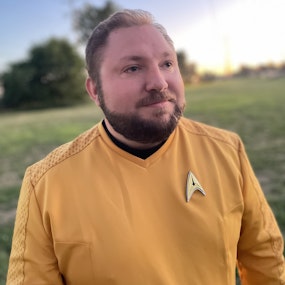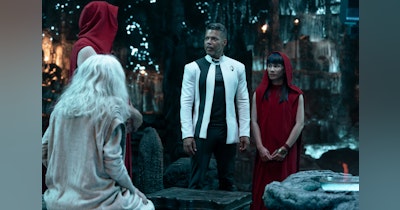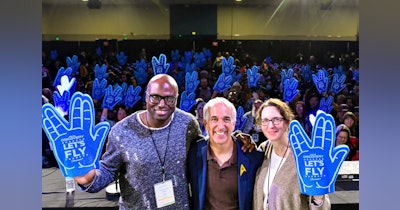**CONTENT WARNING: This article speaks on sensitive topics like suicide and racism. Reader discretion is advised. Spoilers are also detailed for episode 301**
June 2nd marked what should have been the triumphant return of The Orville, Seth McFarlane's love letter to Star Trek of the 90s. After a worldwide pandemic and multiple delays with production, The Orville New Horizons premiered on its new home Hulu a little over three years removed from its second season finale.
In the season three premiere, "Electric Sheep," The Orville picks back up on the events of the series' first two-parter, "Identity." In the first part Isaac, an android-type member of the Kaylon species is deactivated and returned to his home planet. On Kaylon 1, it is revealed that the Kaylons have secretly been gathering all the data they need on biological life via Isaac to stage a full-on genocide of the human race.
To make matters worse, Isaac sides with his people for much of the two parts of "Identity." Yes, Isaac constantly questions the Primary throughout "Identity, Pt. 2", but his inaction until Ty Finn is put in mortal danger ultimately costs the Planetary Union thirty-two ships and what had to have been thousands of lives.
Flash forward to after the war, and understandably there is a lot of mistrust and disdain toward not only the Kaylons but also Isaac. At the end of "Identity, Pt. 2," Ed goes to bat for Isaac, and not in some half-assed way. He takes full responsibility for Isaac, who ultimately stays aboard the Orville, even as the Union wants to interrogate and deactivate him. Ed's actions harken to the very best of Trek episodes that deal with redemption, and we seem to start on that path here with Isaac.
But this is where the trouble starts almost immediately in "Electric Sheep." I don't know if there is some amnesia from having been off the air for over three years, but Isaac's redemption seems to be put on ice. Aboard Orville, he mainly sticks to his science lab alone. And when he does try to interact with his fellow shipmates, he's met with disdain and borderline racism. Not very Star Trek, and certainly not very IDIC.
And this scene in the mess hall introduces us to one of The Orville's newest characters and perhaps the show's biggest problem: Ensign Charly Burke. I rarely criticize an acting performance, but Anne Winters' introduction as Burke is cringe-worthy. It could honestly be a case of poor writing and direction, which seems to plague this entire episode, but I think sadly, both are true.
Anne Winters as Ensign Charly Burke. Is she redeemable after just one episode?
Her survival story from the Battle of Earth would typically any viewer empathize with her, but any empathy that could have been there is erased when she blames the entire battle on Isaac. Once again, people are grieving and some anger towards Isaac is natural, but Burke takes it too far by telling him to stay out of the mess hall and that "it makes people sick to look at [him.]." Strike one of many against Ensign Burke.
Later, when Burke is found out, her hatred and borderline racism continue when she pleads the case for the "entire crew" that Isaac is the enemy. Thankfully, Commander Grayson reminds her that Isaac is the one who saved them, a fact that many people on this ship seem to be forgetting. That reminder doesn't seem to be heard by Ed, who, for god knows what reason, admits to Burke that reinstating Isaac may not have been the right call. For real? The Ed Mercer who got Isaac reinstated in "Identity" was a Captain determined to stand up for his crewmember.
Worse, Mercer echoes what Admiral Halsey said in that episode; that Isaac may be the key to fighting off the Kaylon later down the line. It truly feels like Ed forgot everything he said to get Isaac back in the first place and is now more worried about towing the company line. Strike two against Burke and a big strike one against the Captain.
Really Ed? Really?
Burke's campaign of hate and racism doesn't even begin to stop there. When Gordon Malloy returns to Orville aboard a fancy new Union fighter, he completely ignores that he is part of the senior staff or that he is Burke's superior officer and shares in her racism and hatred. Forget the fact he is part of the senior staff for a second. Every minute this episode went on and a character like Burke was allowed to freely go around the ship telling people to hang on to her hate, it became clearer something was very wrong in The Orville's writers room.
Not even 20 minutes in, that's already strike three for young Ensign Burke and strike one for our second senior officer Gordon.
The hate doesn't stop with Ensign Burke, and this is where things continue to get even more confusing. Isaac returns to his lab, only to see it defaced with the word "murderer" graffitied over a console. The culprit? Ty's brother Marcus. Did Marcus forget that Isaac single-handedly saved Ty's life? Did Marcus forget that Isaac had a relationship with his mom?
Subtle...
Don't get me wrong; the events of "Identity" would fuck me up pretty bad too if the person/machine my mom was dating all of a sudden brought his entire species to reign down fire on Earth, but to just all of a sudden put the black and white blinders on? Why did no one offer these kids some therapy? Why didn't Claire talk about her feelings about this with her boys more? It's okay to have these feelings of course, but they just seem to come out of nowhere, which ends up feeling forced and very Game of Thrones season eight. Strike one for Marcus, and strike one for the Union for not getting Ty and Marcus some help.
Unfortunately, Mercer's complete lack of leadership and Claire's questionable decision to bring Isaac into their quarters to speak with Marcus led to a tragedy that could have 100% been avoided: Isaac takes his own life. It doesn't matter if it's a Human, Moclan, or Kaylon; a failure in leadership combined with hazing, bullying, and hatred led a member of The Orville's crew to kill himself. How is it ever okay to portray suicide like this?
Let me be very clear. I'm not a suicide survivor. I've never actually gone through with any attempt on my life. But my adolescence was riddled with suicidal thoughts for a very long time. Suicide is very complicated. It is never cut and dry. That's why what happens next in "Electrip Sheep" feels insulting and wrong.
Claire, rightfully, goes to comfort Marcus after such a traumatic event but says all the wrong things. "Isaac made a choice. It was the wrong choice, but it was his alone." How is that okay? Really. How is that okay? Your son told Isaac to his face that he wished he was dead. He had just been harassed in the mess hall. I don't care if Isaac is incapable of feeling emotions (and the show often suggests that is not the case); he was harassed to the point of suicide.
How many autistic kids have a hard time processing or understanding their emotions and have been harassed and bullied? How many of them have taken their lives?. It's the same thing, and it's irresponsible for The Orville to put the blame solely on a person who is ultimately a victim.
It gets repetitive at this point, but it only gets worse from here once again. Much later in the episode, Ed finally grows a pair and has his "leave any bigotry in your quarters" Captain Kirk moment and relieves Burke of duty after spouting more hate and racism, and finally, refusing a direct order. It's an extreme case of too little too late. In reality, she should have been transferred or even court-martialed for the hand she had in Isaac's death.
But when Marcus goes to ask her for help in possibly bringing Isaac back (a cheap cop-out that we will get to later), and he admits that he was part of the reason Isaac did kill himself, Burke straight up says to him, "When somebody takes their own life...it's nobody's fault." Shame on you, Orville, shame on you. How horribly wrong and irresponsible this line of dialogue is.
What about all the people, adults and kids alike who suffer from anxiety and depression just like me, who don't feel like they have any other avenue left? What about all the people who are bullied to the point they've been made to believe they don't have a place on this Earth anymore?
What about all the members of the LGBTQ+ community who are demoralized and told they aren't real people? The ones that have parents that won't support them for who they are and disown them, leading them back into the closet that they then unfortunately never come out of?
What about all the people of color who constantly have their rights infringed upon, also being told they are lesser people? Who have to constantly look over their shoulder because of our country's inability to protect them properly? The list, unfortunately, goes on, and on, and on. And for some people, suicide is the only avenue they have left, and that is undoubtedly someone's fault. It means we have failed to protect them. To make them feel wanted. To make them feel like a valued member of society.
I'm not here to say this is the case with every suicide, but it's irresponsible and reprehensible for The Orville to suggest it not once, but twice.
To the show's benefit, the only time "Electric Sheep" seems to get the conversation about suicide back on track takes place during some pillow talk between LaMarr and his Dakeel friend. At one point, she says, "life isn't appealing to everyone. Tastes vary. So when someone decideds to end theirs, we see it as a personal decision."
The voice of any kind of reason in "Electric Sheep"
Is this the other extreme side and opinion in the suicide conversation? Maybe, but it does offer another point of view, one which is being talked about more and more. And another point of view was something "Electric Sheep" was sorely lacking.
The last point I want to make is the cop-out that this episode eventually makes and the victim shaming that proceeds it. Isaac is magically brought back to life via technobabble that would even spin Spock in circles. Before I continue, it is important to say that people are brought back. It does happen, and those people go on and live their lives and hopefully finally get the help they need.
But with Isaac's resurrection, there are no repercussions. Burke is seemingly one of the new main characters of the show, so there will not be a transfer or court-martial. Marcus, for his part, realized how in the wrong he was. But what happens next to Isaac once he's back is so mind-boggling and wrong that I'm still struggling to wrap my head around it. Dr. Claire Finn tries to tell Isaac that his decision to end his life was rash because he didn't give the crew enough time to change their racist and hateful thinking.
She even goes on to say, "There is no problem so immense that it can't be solved in time." Isaac was harassed and bullied to the point that he felt, and yes, he feels, that his life was no longer valued, and here she is making him feel shame for that. Who is Claire to make that distinction? Yes, at the end she makes the right decision and makes sure to offer help if he ever has these feelings again, but once again, I say, too little too late. Isaac taking his life was someone's fault. It was a failure in leadership and a failure from those that call him a friend to protect him.
Suicide is a very sensitive subject. That is something that is never going to change, which is why I was a bit baffled there was no content warning that played ahead of "Electric Sheep." At the end of the day, when someone chooses to take their own life, it has lasting repercussions for those left behind in the wake. But we don't spend enough time trying to help or understand the person who felt so lost that they felt that this was their only option.
There needs to be a forum for this conversation, always and forever. Television and film need to do a better job on how suicide is talked about and portrayed on the screen. Some have managed to do just that, but unfortunately, The Orville's third season premiere fails in having that conversation in every way possible. I know the cast, crew, and writers can do better; The Orville has been a fantastic show. Let's hope they can do better the next time another sensitive topic comes back up.
The Orville: New Horizons is currently streaming on Hulu with new episodes dropping every Thursday.



















